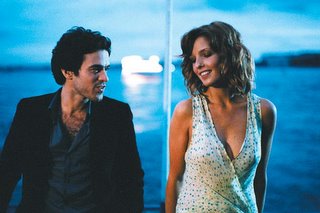

French writer and director Cedric Klapisch has impressed critics and audiences with his humorous, warm-hearted interpretations of individual relationships and has demonstrated a unique talent for capturing the nuances and flow of human interaction. Best known for 2002’s international hit, L’Auberge Espagnole, Klapisch studied film at NYU and, after a series of successful short films, established himself in the French film industry with Le Peril Jeune in 1994. Klapisch followed this with his 1996 comedy Chacun Cherche son Chat and Un Air de Famille starring Agnès Jaoui and Jean-Pierre Bacri. L’Auberge Espagnole, which follows a young French boy to Barcelona where he moves into an apartment with friends from all over the world and embarks on a series of adventures that serve as his initiation into life. Klapisch followed L’Auberge Espagnole with the recently released (and top of the French box office) Les Poupées Russes which reunites the Auberge cast for a wedding in Russia and a glimpse into the lives of our favorite characters as they experience life in the real world.
« Je pense que la petite révolution de la nouvelle vague a correspondu à une sorte de préparation des années 60. La nouvelle vague, c'était presque une préparation artistique de ça. C’est-à-dire qu’il y avait un espace de besoin de changer des règles, changer des règles de narration, changer des règles a plusieurs niveaux. À ce moment, je pense que depuis ça, il n'y a pas eu une époque aussi forte que ça et donc c’est vrai que le cinéma français essai de se revenir là toujours. La nouvelle vague c’est qu’il y avait plusieurs personnes qui travaillaient ensemble avec une volonté de changer des choses. Donc on les a mis ensemble dans le même groupe et ça qu’il n’y a plus jamais de groupe comme ça. Le développement du monde indique que les artistes sont plus individuels... »
“I think that the small revolution of the New Wave corresponded to a sort of preparation to the 1960s. 1968 – the New Wave was a sort of preparation for that. In other words, there was a need to change the rules, to change the rules of narration, to change the rules on many levels. So I think that since then, there hasn’t been a period as strong as that and so it’s true that French cinema is constantly trying to go back there. The New Wave was a movement where there were many people working together with a common will to change things.
Thus, we classified them all into the same group and there hasn’t since been a group like that. The development of the world indicates that artists are no longer individuals… »
« Le monde a beaucoup évolué...il y avait une sorte de besoin culturelle...et du coup des choses très personnelles, les gens se sont intéressés...aujourd’hui le commerce a gagné partout et être un auteur aujourd’hui…on ne peut pas se séparer du commerce...Aujourd’hui, les gens qui font des films pour eux-mêmes n’ont aucun public... »
«The world has evolved a great deal…there was a sort of cultural need…and people became interested in very personal things…today commerce has triumphed all over and to be an auteur today is hard to separate from commerce. Today, people who only make films for themselves don’t have any audience…”
« C’est tres difficile de parler des films hollywoodien parce qu’aujourd’hui aux Etats-Unis, il y a des vrais auteurs, des vrais films d’auteur, ce que vous appelez le cinéma indépendant. Il n’y a pas de commerce représenté par Hollywood et des auteurs –, – c’est beaucoup plus mélangé que ça. »
“It’s difficult to talk about Hollywood films because today in the United States there are true auteurs, true auteur films, what you call “independent cinema.” There isn’t just commerce represented by Hollywood and then auteurs; it’s much more mixed and complex than that.”
« Quand on voit des films du genre très Hollywoodien et quand on voit Amélie Poulain, il y a une espèce de nouvelle tendance où le cinéma commercial peut être très particulier et très original. Pendant la Nouvelle Vague, le film d’auteur était contre ; contre le commerce … »
“When one sees very Hollywood films and films like Amélie Poulain, there is this new trend where commercial cinema can be very particular and very original. During the New Wave, auteur films were against all of this, against commerce…”
« Tourner aux Etats-Unis, on se perd soi-même. »
“Filming in the United States, one loses oneself.”
« C’est impossible de ne pas changer. »
“It is impossible not to change.”


No comments:
Post a Comment